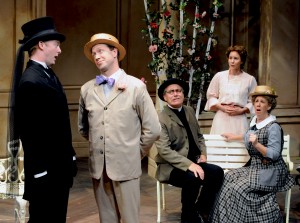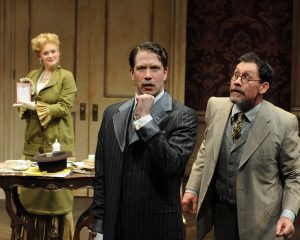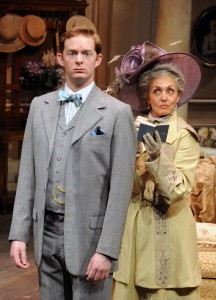Earnest and Travesties Make a Top-Rate Double Bill

(L to R) Brian Mackey, Jordan Miller, David Cochran Heath, Rachel Vanwormer, and Maggie Carney
Photos by Ken Jacques
Pairing the likes of Oscar Wilde’s seminal comedy, The Importance of Being Earnest, with Tom Stoppard’s heady Travesties may seem perverse, but it’s become a common regional and university theatre exercise in repertory. In fact, Cygnet Theatre’s artistic director Sean Murray brought the pairing to San Diego once before, when he headed the North Coast Repertory Theatre. He’s brought it back, splendidly, to Cygnet, where it will run until October 27.
The Importance of Being Earnest is just about as perfect a comedy as could be imagined. The mechanics of the plot fit together without a hitch, the characters are rich and rife with possibilities for actors, and Wilde’s witticisms fly into the air, landing perfectly every time. The three-act plot revolves around two young men, Algernon (Jordan Miller) and Jack (Brian Mackey) who each invent reasons to leave their homes, one in the city, the other in the country, to visit the opposite place. Algernon wishes to escape the clutches of his Aunt Augusta, the Lady Bracknell (Linda Libby), while Jack is wooing Algernon’s cousin, Gwendolen (Jacque Wilke). Meanwhile, Algernon gets wind that Jack has an 18-year-old ward, Cecily (Rachael Vanwormer), and he sets out to the country to meet her. Both men use the name Earnest to disguise their identities at one time or another.
Travesties in a way deconstructs Earnest, as part of an intellectual tour-de-force that examines the “travesty” of falsely constructed memory. Set in 1917 Zurich, a city teeming with conspirators, spies, and revolutionaries, Mr. Stoppard appropriates four historical characters, Vladimir Lenin (Manny Fernandes), who is attempting to translate Karl Marx’s writing into a Russian political revolution, James Joyce (Patrick McBride), who is attempting to revolutionize literature with his novel, “Ulysses,” Tristan Tzara (Mr. Mackey), who through poetry and performance art is launching the Dadaist movement, and Henry Carr (Mr. Miller), who is working in the British embassy. Then, he mixes in Gwendolen and Cecily from Earnest, as well as a good deal of dialogue from Wilde’s play.
Sound confusing? Well, it is, at least for a while (be sure to see Earnest first or you may be even more confused). Focusing on Henry Carr as an old man, the play examines his memories of this revolutionary time from the standpoint of one who, looking back on it, yearned to be the revolutionary he was not. Carr imagines interacting with all three of the historical figures, where he may only have interacted with Joyce (who directed a production of Earnest which Carr played Algernon). Mr. Stoppard structures the play to show how each time memory is produced, especially if that memory is hazy, it can contain the same basic elements but go in vastly different directions. A scene between Carr and Bennett (David Cochran Heath), his butler, is literally “rewound” several times, each time producing a different result. And, incidental information is jumbled into the mix: for example, as Joyce was from Limerick, Carr remembers his first meeting with Joyce as one where everyone speaks in limericks. Eventually, Carr brings in memories of Gwendolen and Cecily, two women in his sphere who share names with the Wilde characters, and those women become their Wilde characters (as Carr becomes Algernon, and he imagines Tzara becoming Jack).
Mr. Stoppard loves the absurd, and he throws all of these absurdist devices at his audience in quick succession. You may be frustrated and tempted to leave at intermission. Don’t. He pulls the various elements together in Act 2, where the devices he introduces in Act 1 start to make better sense.
Mr. Murray has staged Earnest traditionally, with few visual gimmicks. While some scholars find that Wilde provided many clues to his own sexual identity in the play’s subtext, you’ll find none of it in the Cygnet production. Lady Bracknell, a drag role if there ever was one, is played by Linda Libby, and Ms. Libby makes an excellent case for gendering her character as female. Mr. Murray’s staging of Travesties is darker and a little more dependent on gimmicks, but it is effective all the same.
In repertory, there are always compromises, and actors are not always ideally suited to the roles they play. Mr. Miller’s Carr requires major acting chops, so one might forgive him if his Algernon is a bit of a fop. Mr. Mackey looks miscast as Jack (though, he handles the role quite capably), but he is a brilliant Tzara. Ms. Wilke has a bit of “bad girl” in her that can make her portrayals interesting. It popped up early in Earnest but then disappeared. I wished that it had re-emerged. Mr. Fernandes made a noble and more interesting Lenin than he did as the two put-upon butlers in Earnest. Ms. Carney has much more to do in Earnest than she did in Travesties, and so her Earnest role stood out. Mr. McBride captures Joyce’s slyness and his pig-headedness, but perhaps not his brilliance. Ms. Vanwormer plays at least three different versions of a character named Cecily, and all of them were distinct and well-considered. And, in his Cygnet debut, Mr. Heath, the Lamb’s Players Theatre mainstay, manages to humanize the parson in Earnest (a role that is often played as doddering and out-of-touch), and to bring well-timed humor to the butler in Travesties, a “comedy” whose humor often arrives too long after the joke is done. [php snippet=1]Set designer Sean Fanning has constructed a basic structure that can easily be adapted to the variety of scenes needed in both plays. Chris Rynne’s lighting design is flexible enough to portray the brightness of Earnest and the darkness of Travesties. Kevin Anthenill’s sound design (which includes contributions on the piano by David McBean) strikes the right mood for each occasion. But, it is Shirley Pierson’s costume design that gives Earnest its elegance while helping Travesties to find its core, however ironic that core turns out to be.
These are both “don’t miss” productions, so, tempting as it might be, please don’t content yourself with the froth of Earnest and miss out of the intellectual games of Travesties. But, see Earnest first.
[box] See the Cygnet website, linked below, for a performance schedule of the two productions. Tickets are priced $29 – $49, with some discounts available. It is possible to see both in one day, but it is a long sit, as each play is 2 1/2 hours in length. Parking in Old Town can be difficult. The theatre has a small, valet-operated, lot. As an alternative, park at the Old Town transit center lot (enter from Pacific Highway); it is a 5-10 minute walk to the theatre.




